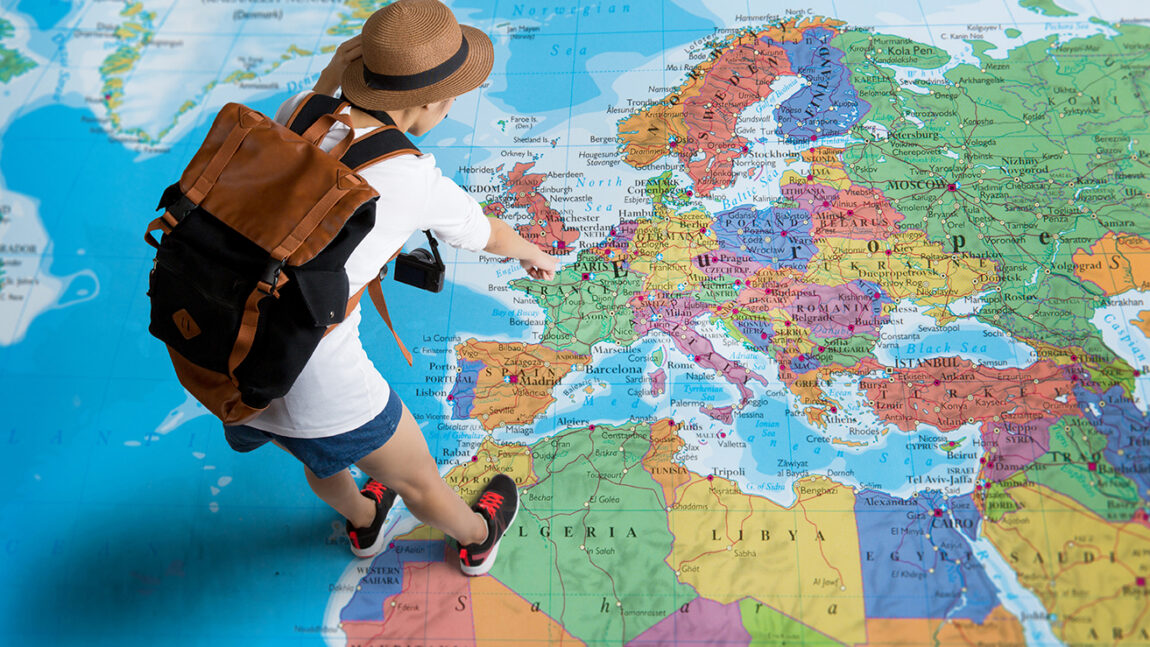Going abroad to learn the language
Often, when someone wants to improve their English, they decide to move abroad. Experiencing the culture and language of a country allows people to let go of their prejudices and open up to new influences. It sounds great, but it’s not as easy as it seems.
No matter how badly we want to buy a one-way ticket to a new country, reality brings us back. We all have jobs and responsibilities; some need to take care of their family. The project of going abroad is set aside until the only way to practice the language is the occasional holiday. We tell ourselves that moving is too drastic, that we won’t be able to learn the proper (what is proper anyway?) language.
Even if we don’t want to admit it, going abroad provides an immersive experience difficult to replicate anywhere else. And believe me, I have been trying.
These are some reasons why moving to a foreign country is the best thing you can do to improve the language:
- Immersion. Yes, at the beginning it may feel like it’s too much, especially if you don’t know the language well, but that’s the point. Out there, you either succeed or fail. And if you have moved abroad, you are braver than you think. Get out there and try. Start with short, everyday interactions (paying your shopping at the till, asking for directions, giving directions, ordering food), they are very important to help you improve pronunciation, rhythm, vocabulary, and much more. Don’t stop and keep going.
- It’s not just about the language. At the beginning of our journey, we focus too much on grammar rules, correct pronunciation, exercises but the learning process is not just about that. In most pubs of London, ordering two pints of beer could turn into a fight, if the back of your hand is facing the person you’re speaking to. In the UK, that gesture is like showing your middle finger. Some things you can only learn on site.
- Humour. No matter how fluent you may be or how good your accent is, one needs to experience certain things. Sense of humour is rooted in past and contemporary events. And if you think you can learn everything off of a book, why are you even reading this article? Go deep into the culture of the country you’re visiting, read about its history, engage with its political debates, go see the local comedians.
- Food. This is easy. Food is an important part of a people’s identity. The cuisine tells us about the country’s resources, past habits, class system and social status.
- Idioms. Streaming platforms like Netflix have made it much easier for us to watch films and TV shows in their original language. This means we hear a lot of idiomatic expressions but there’s nothing like real life to better understand why certain sentences work in specific contexts.
- Life experience. This has to do with our personal growth. Travelling and living in a different reality enable us to push our limits, understand other people’s perspectives, values, and morals. We need to be humble and open-minded. It’s a really important point.
- The atmosphere. City streets smell differently depending on where (and sometimes what part of the country) you are. Unfamiliar landscapes, colours, everything makes this new place more real. The way you experience this new country varies on where you travel to.
- New people. This is a subsection of point six but it is important enough to be on its own. As scary as it is to leave our friends and family behind, making new friends and sharing experiences together is an exciting perspective.
- Professional growth. Being bilingual (or multilingual) opens a lot of job opportunities.
- Becoming a citizen of the world. Why stop at learning one language. Our world is smaller than we think. Travelling is more affordable and quicker, learning a new – or more than one – language will help you understand the people living by your side, building understanding and harmony.
wrong.
What is the best way to learn English? Often, the answer is “moving abroad”. There is nothing like experiencing a new culture and language first-hand, and letting go of our preconceptions to open ourselves up to new influences. It sounds great, doesn’t it? It’s also easier said than done.
No matter how often we daydream about buying a one-way ticket to a foreign country, reality brings us back. We all have jobs and responsibilities; some need to take care of their family. The project of going away for a year or two turns into a month-long course, and finally in the occasional trip that gets us all excited because we’ll be able to practice what we remember. We tell ourselves that moving is an overrated solution, that language courses are filled with international students and teachers. Will we learn the proper language (whatever that means)?
No matter how angry we get, going abroad provides an immersive experience difficult to reproduce anywhere else. And believe me, I have been trying.
These are some reasons why moving to a foreign country is the best thing you can do to improve the language:
- Immersion. Yes, at the beginning it may feel like drowning, especially if you don’t know the language well, but that’s the whole point. Out there, you either sink or swim. And if you have moved abroad, you are braver than you think. Get out there and try. Start with short, everyday interactions (paying your shopping at the till, asking for directions, giving directions, ordering food), they are fundamental to help you improve pronunciation, rhythm, vocabulary, and much more. Don’t be discouraged, keep going.
- It’s not just about the language. Early on in our journey, we focus too much on grammar rules, correct pronunciation, exercises but the learning process is not just about understanding and using proper form and correct vocabulary. In most pubs of London, ordering two pints of beer could turn into a fight, if the back of your hand is facing the person you’re speaking to. In the UK, that gesture is like showing your middle finger. Some things you can only learn on site.
- Humour. No matter how fluent you may be or how refined your accent is, you can only learn certain things if you experience them. Sense of humour is deeply rooted in past and contemporary events. And if you think you can learn everything off of a book, why are you even reading this article? Explore the culture of the country you’re visiting, read about its history, engage with its political debates, go see the local comedians.
- Food. This should be quite obvious. Food is an important part of a people’s identity. The cuisine tells us about the country’s resources, past habits, class system and social status.
- Idioms. Streaming platforms like Netflix have made it much easier for us to watch films and TV shows in their original language. This means we are a lot more exposed to idiomatic expressions but there’s nothing like actual life to better understand why certain expressions work in specific contexts.
- Life experience. This has to do with our growth as a human being. Travelling and living in a different reality allows us to push our limits, understand other people’s perspectives, values, and morals. We’ll need to be humble and open-minded. It’s a challenge that can’t be underestimated.
- The atmosphere. City streets smell differently depending on where (and sometimes what part of the country) you are. Unfamiliar landscapes, colours, everything makes this new place more real. Go North and you’ll experience long summer days; go South and the sun will set in a few minutes.
- New people. This could be a subsection of point six but it is important enough to be on its own. As scary as it is to leave our friends and family behind, the perspective of making new friends, listening to their stories and sharing experiences together is quite exciting.
- Professional growth. Being bilingual (or multilingual) opens countless more job opportunities.
- Becoming a citizen of the world. Why stop at learning one language. Our world is much smaller than it used to be. Travelling has become more affordable and quicker, learning a new – or more than one – language will help you understand the people living by your side, building understanding and harmony.
What is the best way to learn English? More often than not, the answer is “moving abroad”. There is nothing like immersing oneself in another culture and language, letting go of our preconceptions and opening ourselves up to new influences. It sounds great, doesn’t it? It’s also easier said than done.
No matter how often we daydream about hopping on a one-way journey to a foreign country, reality brings our feet back to the ground. We all have jobs and responsibilities; some could have a family that depends on them. The project of going away for a year or two turns into a month-long course, until it shrinks into the occasional trip that gets us all excited because we’ll be able to put in practice what we remember. We tell ourselves that moving is an overrated solution, that language courses are filled with international students and teachers. Will we learn the proper language (whatever that means)?
No matter how much we sulk about it, going abroad provides an immersive experience difficult to replicate anywhere else. And take my word for it, I have been trying.
These are some reasons why moving to a foreign country is the best thing you can do to speed up your learning process:
- Immersion. Yes, at the beginning it may feel like drowning, especially if you have a rudimentary understanding, but that’s the whole point. Out there, you either sink or swim. And if you have moved abroad, you are more of a swimmer than you give yourself credit for. Get out there and paddle. You may start with short and mundane interactions (paying your shopping at the till, asking for directions, giving directions, ordering food), but they are fundamental to help you get a grip on pronunciation, rhythm, vocabulary, and much more. Don’t be discouraged, persist.
- It’s not just about the language. Early on in our journey, we end up getting too wrapped up in grammar rules, correct pronunciation, exercises but the learning process is not just about understanding and using proper form and correct vocabulary. In most pubs of London, ordering two pints of beer could turn into a fight, if the back of your hand is facing your interlocutor. In the UK, that gesture is the equivalent of showing your middle finger. Some things you can only learn on site.
- Humour. No matter how fluent you may be or how polished your accent is, one picks up certain things only if they are experienced first-hand. Sense of humour is deeply rooted in past as well as in contemporary events. And if you fool yourself you can learn everything off of a book, why are you even reading this article? Explore the culture of the country you’re visiting, read about their history, engage with its political debates, go see the local comedians.
- Food. This should be a no-brainer. Food is an integral part of a people’s identity. The cuisine is a compass to find out about the natural resources, past habits, class system and social status.
- Idioms. Sure, streaming platforms have made it much easier for us to watch films and TV shows in their original language. This means we are a lot more exposed to idiomatic expressions but there’s nothing like unstaged, not watered-down life to better understand why certain expressions work in specific contexts.
- Life experience. This has to do with our growth as a human being. Travelling and living in a different reality is what allows us to push our limits, understand other people’s perspectives, values, and morals. It requires humility and an open mind. It’s a challenge that can’t be underestimated.
- The atmosphere. Or whatever the cool kids call it nowadays (is it vibe or mood?). City streets smell very differently depending on where (and sometimes what part of the country) you are. Unfamiliar landscapes, colours, everything contributes to making this new place more solid and real. Go North and you’ll experience summer days that stretch long into the night; go South and the sun will set in a few minutes. One moment you’re admiring the rich colours of sundown, next thing you know the world is wrapped in darkness.
- New people. This could be considered a subsection of point six but it has enough merit to stand on its own. As scary as it may sound to leave our friends and family behind (be it for a month, a year, or the foreseeable future), the perspective of making new friends, listening to their story, becoming part of their life as they become part of ours is quite exciting.
- Professional growth. Being bilingual (or multilingual) opens countless more job opportunities.
- Becoming a citizen of the world. Why stop at learning one language. Our world is a much smaller place than it used to be. Travelling has become more affordable and quicker, learning a new – or more than one – language will help you make sense of those who live by your side, fostering understanding and harmony.



